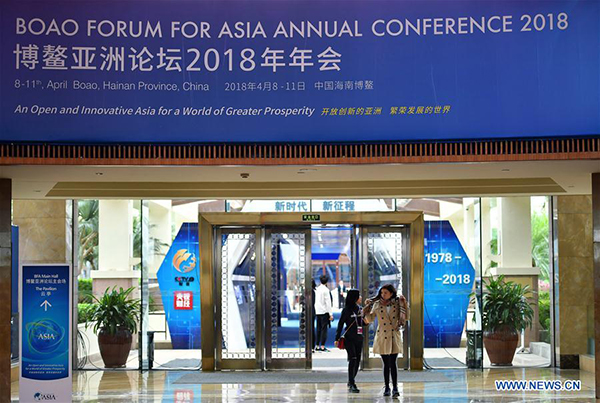China's vision of common destiny of a shared future


The notion of a shared future, for the Asian region, was first used at the Boao Forum in 2015. It has been re-echoed since, in speeches Xi Jinping used at the National People's Congress this year, and at the Davos World Economic Forum in early 2017. In these iterations, it has been expanded to embrace humanity. It is likely that it will figure again at the Boao Forum to be held in South China's Hainan province this year, in this form.
In some senses, this notion of a shared future points in two directions. For Chinese leaders, it is a declaration of legitimate interests – as a fifth of humanity, as the world's second largest economy, as the world's third largest country in terms of size, China has to have a major voice, and be a large stakeholder, in discussing, framing, and then contributing to managing and solving global issues. In that sense, the notion of a statement of the obvious. A global issue will need China to be involved in it, otherwise it isn't global. And for that reason alone, China has a legitimate right to express its opinion, and to be heard. We have to remember that in some parts of modern history, that wasn't the case. China was listened to and wasn't heard. Now it certainly is.
The second direction is simply an acceptance that China now has a responsibility to frame a common language to deal with issues like environmental ones, global governance, security. The forces of protectionism and isolationism that we have seen in the US and EU in the last few years, and which can be traced back to the shock of the global economic crisis of 2008 and its impact on wealth levels, equality and social development, pull in a different way to those that are likely to best be able to address common problems. It seems that in many places there is an attempt to draw boundaries more tightly, to walk away from even trying to think in an international way, and to complain that the global agenda is no longer one that entirely suits the partners that used to be so keen on it.
This language used by Chinese leaders therefore is part of a huge discussion, a global one, about how to create a valid public space in which people can still come together and try to frame understanding, and then potential solutions, to common problems. While talking about a shared vision of human destiny therefore seems to only accentuate positive things, at heart it is also about creating very practical ways of trying to achieve this. That involves the immense effort to prioritize issues, and to at least create common understanding about how they can be tackled.
China does speak into this debate from a very different intellectual tradition, one where the key words of harmony and order have a philosophical basis that often vary from that of what can broadly be called the enlightenment tradition of the West. Enlightenment, together with its aftermath – Modernity – as understood by the West, was neither properly "shared" nor it seems that has adequately fulfilled its proposition for a common future. But the logic of globalization should mean we can embrace this new opportunity for hybridity and diversity – and that having more space for Chinese concepts will help, not hinder. We might even call this new era one of global enlightenment, rather than simply talking of enlightenment being something located in the West and its traditions alone. Perhaps this can give way to the idea of reasoning together (instead of a particular Reason) as a form of progress. A common destiny is thus no longer in the hands of one type of civilization, but in the hands of many.
This is an epistemic challenge, as much as a political or economic ones. For those in traditions outside of China, the key thing is to establish a posture that is open minded, tolerant, and inquisitive, and wants to hear more about what Chinese perspectives on global commons are. There is no 'ownership' of global issues, beyond the fact that they belong to everyone. So Chinese contributions to this debate, in and of themselves, validate and enrich it. No Chinese voice means no properly global discussion. We are all just learning how to speak a new language, but hopefully one that is more appropriate and efficient.
Kerry Brown is professor of Chinese Studies and director of the Lau China Institute, King's College, London. Carla De Utra Mendes has a PhD from the University of Saint Joseph in Macao.




































